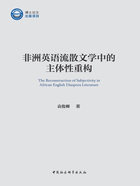
Abstract
Diaspora literature usually refers to literary works related to the topics such as homeland,race,identity,gender,and marginalized experiences and created by writers with cross-border and cross-cultural experiences. However,the situation is different in sub-Saharan Africa. Due to Western colonial invasion,colonial rule,the infiltration of foreign religions and the promotion of Western education,a considerable number of African indigenous people lost their land and were forced to leave their homes to migrate and live in exile in their homeland. Their native religions were impacted by foreign religions and their native languages were influenced by colonial languages. They were invaded by the western culture,but they were deeply rooted in the soil of the local culture. Therefore,they were in a dilemma and unable to obtain a sense of belonging when facing the local and Western culture. In addition,the colonists forcibly demarcated the geographical boundaries of African nation-states based on their respective spheres of influence,which made African indigenous people in a state of mixed contradictions and hesitations in racial identity,national identity and self-identity. All in all,African indigenous people's plights in their homelands,languages,religions,and identities made their subjectivity in a broken and incomplete state. African indigenous people did not have cross-border and the subsequent cross-cultural survival experience. However,the Western colonial aggression and colonial rule objectively had caused the effects. Under the double molding of foreign culture and local culture,they also show the characteristics of diaspora,that is,the native diaspora. In other words,diaspora does not necessarily have to cross national boundaries. The works created by African writers before diaspora and the works irrelevant to the country of immigration but closely related to their home country and written after diaspora can also be classified as diaspora literature. In short,the name of diaspora in the ordinary sense partially enshrouds the reality of African diaspora. In addition to native diaspora,there are also foreign diaspora with cross-border and cross-cultural experiences in Africa,as well as colonial diaspora that specifically refers to African colonists and their descendants. Therefore,African diaspora literature can be divided into three types:native diaspora literature,foreign diaspora literature,and colonial diaspora literature. In these three types of literature,the subjectivity of the protagonists in the works is different. Due to the same historical encounters,similar development processes,and similar situations in the pattern of globalized international power relations,African native diaspora literature and foreign diaspora literature present similar characteristics of resistance writing in terms of creative themes,characters,national psychology,and aesthetics. The similarities are as follows. They drive away the invaders,reclaim the occupied lands,and rebuild homes so that they can have a place to rest physically and mentally. Using national languages or the transformed colonial languages to create works not only protects and saves national languages,but also poses a stance to dispel the dominance of the empire language. By this way,they try to find the lost identity and reconfirm the self. Then the consciousness of women's subjectivity awakens,and the African “Nora” goes out of her home,her country,and abroad to seek independence and future. Nora's leave is a resistance to autocracy and patriarchy. The resistance writing is aimed at reconstructing the complete subjectivity of human beings. The reconstruction of subjectivity in African English diaspora literature is an effort to restore human dignity. It is an effort to explore the path of the individual,the nation,the country,and even Africa.
Key words African English Diaspora Literature;Native Diaspora;Foreign Diaspora;Colonial Diaspora;Subjectivity